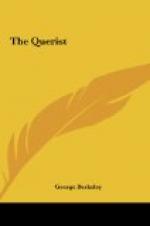187. Qu. Whether, on the contrary, it should not seem worth while to erect a mart of literature in this kingdom, under wiser regulations and better discipline than in any other part of Europe? And whether this would not be an infallible means of drawing men and money into the kingdom?
188. Qu. Whether the governed be not too numerous for the governing part of our college? And whether it might not be expedient to convert thirty natives-places into twenty fellowships?
189. Qu. Whether, if we had two colleges, there might not spring a useful emulation between them? And whether it might not be contrived so to divide the fellows, scholars, and revenues between both, as that no member should be a loser thereby?
190. Qu. Whether ten thousand pounds well laid out might not build a decent college, fit to contain two hundred persons; and whether the purchase money of the chambers would not go a good way towards defraying the expense?
191. Qu. Where this college should be situated?
192. Qu. Whether it is possible a State should not thrive, whereof the lower part were industrious, and the upper wise?
193. Qu. Whether the collected wisdom of ages and nations be not found in books, improved and applied by study?
194. Qu. Whether it was not an Irish professor who first opened the public schools at Oxford? Whether this island hath not been anciently famous for learning? And whether at this day it hath any better chance for being considerable?
195. Qu. Whether we may not with better grace sit down and complain, when we have done all that lies in our power to help ourselves?
196. Qu. Whether the gentleman of estate hath a right to be idle; and whether he ought not to be the great promoter and director of industry among his tenants and neighbours?
197. Qu. Whether the real foundation for wealth must not be laid in the numbers, the frugality, and the industry of the people? And whether all attempts to enrich a nation by other means, as raising the coin, stock-jobbing, and such arts are not vain?
198. Qu. Whether a door ought not to be shut against all other methods of growing rich, save only by industry and. merit? And whether wealth got otherwise would not be ruinous to the public?
199. Qu. Whether the abuse of banks and paper-money is a just objection against the use thereof? And whether such abuse might not easily be prevented?
200. Qu. Whether national banks are not found useful in Venice, Holland, and Hamburg? And whether it is not possible to contrive one that may be useful also in Ireland?
201. Qu. Whether any nation ever was in greater want of such an expedient than Ireland?
202. Qu. Whether the banks of Venice and Amsterdam are not in the hands of the public?
203. Qu. Whether it may not be worth while to inform ourselves in the nature of those banks? And what reason can be assigned why Ireland should not reap the benefit of such public banks as well as other countries?




